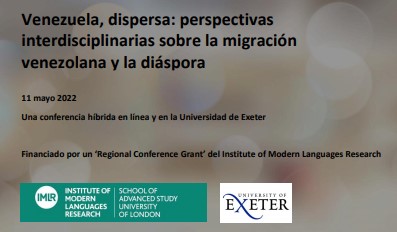Katie Brown discusses the conference ‘Venezuela, Dispersa‘ held at the University of Exeter on 11 May 2022.

With around 6 million displaced people, the Venezuelan emergency is one of the most significant migratory crises in the contemporary world. While Venezuelans have been emigrating steadily over the last two decades, the relatively recent surge from 2015 onwards has presented a fast-changing landscape that necessitates an interdisciplinary lens to better understand and address the ongoing emergency. Thanks to an IMLR Conference Grant, ‘Venezuela, Dispersa’ brought together researchers from across the humanities, social sciences, medicine and even architecture, as well as representatives of NGOs, to share their work on this urgent topic.
The conference was organised by Dr Rebecca Irons, a medical anthropologist from UCL, and Dr Katie Brown from Exeter, who specialises in Latin American literature. This combination is indicative of range of interests and methodologies covered on the day. Over nine packed hours, twenty-two speakers presented their research methods and findings both in person and online.
We began with a keynote from Cinzia de Santis, CEO of Healing Venezuela, a charity that offers medical assistance to people in Venezuela, including providing medical supplies and sponsoring junior doctors. De Santis gave inspiring examples of the charity’s work and its impact in Venezuela. This was followed by panels on the cultural rights and literary production of Venezuelan migrants; political mobilization, asylum seeking and everyday survival; representation and discourse; access to healthcare (particularly sexual and reproductive care); creativity, work and intersectionality; and oral testimony and autobiography. Throughout we saw examples of quantitative and qualitative methodologies, including creative methodologies such as Photovoice (giving participants cameras to present themselves through photography) or using Whatsapp voicenotes as an archive. The conference ended with a bilingual reading from Inventario para después de la guerra/Inventory for After the War, by Raquel Rivas Rojas, which has just been published by La Joyita Cartonera in Chile. This visceral collection of prose poetry evokes the sounds, tastes, fears, pain and loss experienced in Venezuela.
Participants welcomed the chance to learn about both the findings and methodologies of other researchers, especially as there were clear overlaps (e.g., when similar concerns and language appeared in ethnographic studies and contemporary literature). As Venezuela is still not widely studied, many participants reported working or studying in departments where no one else was familiar with the topic of their research as quite an isolating experience. The conference was therefore a valuable opportunity for collaboration, networking and enriching feedback. Manuel D’Hers, who visited Exeter from Universitat Rovira i Virgili in Tarragona, Spain, noted:
Fue una gran oportunidad de poder compartir con otros compañeros y compañeras sobre Venezuela, reflexionar sobre el país, pero también compartir inquietudes académicas en nuestro proceso de investigar y pensar Venezuela desde nuestras propias experiencias migratorias. Ojalá se repita y volvamos a compartir.
[It was a great opportunity to be able to share with other colleagues about Venezuela, to reflect on the country, but also to share academic concerns in our process of researching and thinking about Venezuela from our own migratory experiences. Hopefully it will be repeated and we will come together again.]
The conference provided emerging researchers with an opportunity to develop their work and gain experience of academic practice. Erick Moreno Superlano, for example, presented his first ever conference paper in preparation for starting an MSc in Migration Studies at Oxford University.
The full conference programme is available online, and a report on the conference was published in the Venezuelan newspaper El Nacional.
Dr Katie Brown, Senior Lecturer in Latin American Studies, University of Exeter
